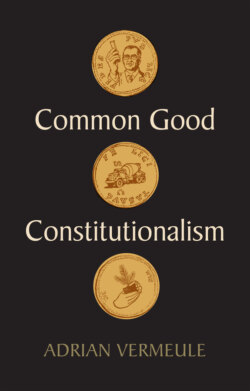Читать книгу Common Good Constitutionalism - Adrian Vermeule - Страница 8
Introduction: The Return of the Classical Legal Tradition
ОглавлениеAmerican public law suffers from a terrible amnesia. Putting aside the work of a few legal historians and other specialists, our law has all but lost the memory of its own origins and formative influences in the classical legal tradition – particularly the ius commune, the classical European synthesis of Roman law, canon law, and local civil law.1 The ius commune was heavily influential in England, in a somewhat variant form;2 both English and continental streams influenced Americans right from the beginning, throughout the nineteenth century and well into the twentieth.
The consequence of this amnesia is that our public law now oscillates restlessly and unhappily between two dominant approaches, progressivism and originalism, both of which distort the true nature of law and betray our own legal traditions. Against both camps, I argue for a view I will call common good constitutionalism. On this view, the classical tradition should be explicitly recovered and adapted as the matrix within which American judges read our Constitution, our statutes, and our administrative law. The centerpiece of the classical legal tradition is that law should be seen as a reasoned ordering to the common good, the “art of goodness and fairness,”3 as the Roman jurist Ulpian put it – an act of purposive and reasoned rulership that promotes the good of law’s subjects as members of a flourishing political community, and ultimately as members of the community of peoples and nations. Accordingly, the master principle of our public law should be the classical principle that all officials have a duty, and corresponding authority, to promote the common good – albeit in a manner consistent with the requirements of their particular roles, an important qualification to which I shall often return.
This classical conception embodies the best of our own tradition, the union of well-ordered reason with public authority. And if anything has a claim to capturing the “original understanding” of the Constitution, this does. The classical law is the original understanding. In that sense, this book is as much a work of memory and recovery as of theory. So-called “originalism,” which in its elaborated theoretical form is a product of the conservative legal movement’s particular political and rhetorical situation after World War II, is profoundly anachronistic, indeed counter-originalist.4 The classical law was deeply inscribed in our legal traditions well before the founding era, and was explicit in legal practice through the nineteenth century and into the twentieth century. Indeed, the classical vision was central to the American legal world until it began to break down, initially in the period before World War I and finally after World War II. The precise timing is immaterial for my purposes, but it is clear that by the 1960s a radical shift had occurred. The so-called “Legal Process” school,5 which emphasized law as a purposive ordering, represented a last iteration of the classical legal tradition but in a thin, impoverished version, bereft of the rich background of tradition and principle worked out over many centuries by the ius commune. The classical tradition, by contrast, is robust. It openly embraces the view that law is ordered to the common good, explains why it is law’s nature to be so ordered, and claims that the positive law based on the will of the civil lawmaker, while worthy of great respect in its sphere, is contained within a larger objective order of legal principles and can only be interpreted in accordance with those principles.
I certainly do not advocate a revival of the classical law because it is the original understanding. The suggestion is not that, as good originalists deep down, we should adopt the view of the classical legal tradition in a derivative fashion. As we will see, all attempts to combine originalism with the classical view of law are ultimately incoherent, an attempt to mix oil and water. On the contrary, precisely to the extent that American lawyers are genuinely originalist, they should have the courage to discard originalism altogether in favor of the classical law, the fundamental matrix for the thinking of the whole founding generation. The truly principled originalist would immolate his own method and transform himself into a classical lawyer, in an act of intellectual self-abnegation and self-overcoming.
Of course a simple return to the classical legal tradition and its particular legal rules is neither desirable nor even possible. Even were that feasible, which it is not, one would risk simply recreating the conditions that caused the present to come into being. But the core theoretical insights and jurisprudential principles of the classical legal tradition can be recovered, adapted and translated6 into our world, so as to yield a better interpretation of the past and present of our operative constitutional order. Those insights are scarcely so remote as to preclude recovery; in fact, they are close at hand, if obscured from our current vision. Key elements of the classical view of law remain vital within our law, even as lawyers and judges have ceased to defend or even recognize them.
